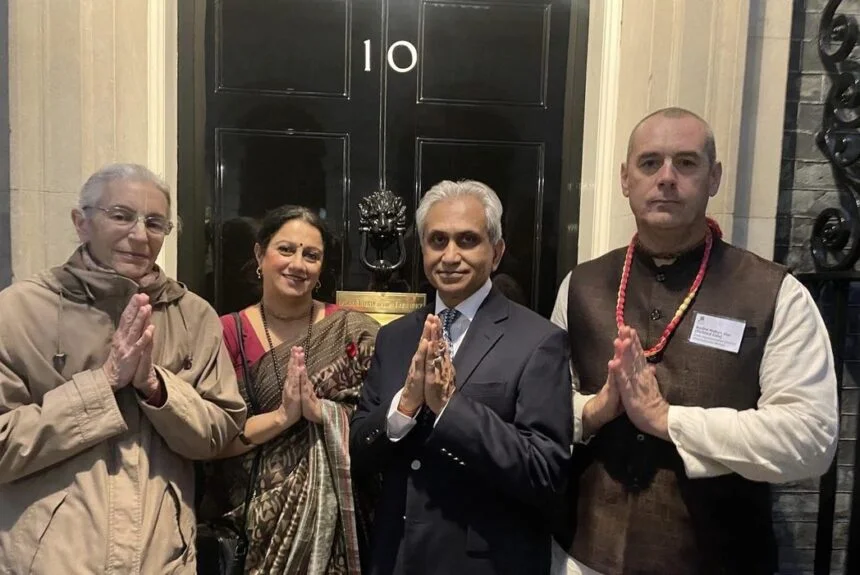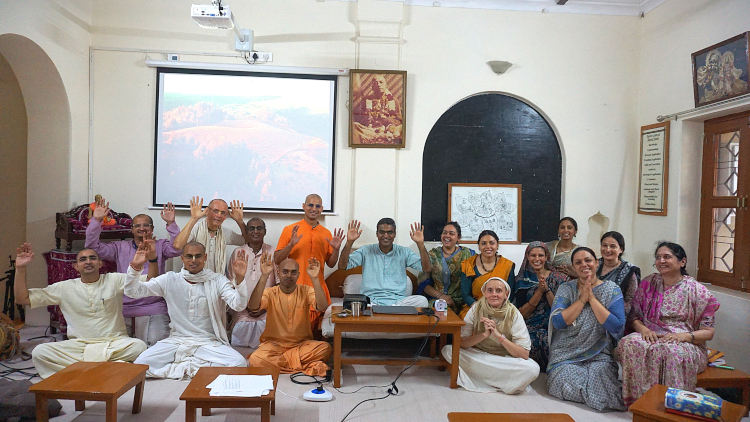Toothpaste with a Spoon
By Venkata Bhatta Das (Vineet Chander) | Jul 31, 2010

Fifth graders can be both quick to speak and unbelievably cruel with their words. Keenly aware of this dangerous combination, my fifth grade teacher devised a simple demonstration to get us to be more mindful of what we said and how we said it. Calling up a volunteer, she handed the student a tube of toothpaste and asked him to squeeze some out on to a paper plate. With ease, he let loose a sizable stream of fluoride-infused paste on to the plate. Without missing a beat, the teacher handed him a plastic spoon and instructed him to now return the paste to the tube. As we giggled along, he awkwardly attempted to scoop up the paste and force it back in. Of course it didn’t go in—and that was precisely the point.
“Harsh words spoken in haste come out so easily and quickly,” the teacher admonished us, “but once they’ve been said, it is not so easy to take them back.”
About a month ago, I found myself having an awkward “toothpaste with a spoon” moment of my own—right here at ISKCON News.
Here’s how it went down: In June, ISKCON News ran a story, taken from a secular college newspaper, about a Hare Krishna monk named Paramesvara Das distributing books on the campus of Western Washington University.
Occasionally, at ISKCON News we run stories from the secular press that are about ISKCON members or of particular interest to friends and members of ISKCON. We think it is important (and healthy) to be aware of what people are saying about us—good, bad, and ugly.
As I read the story about Paramesvara distributing books on the Western campus, I realized that the story was of the less-than-flattering variety. Two students described their individual negative encounters with the devotee, and both zeroed-in on his asking them for a monetary donation. The story also quoted Paramesvara Prabhu himself as admitting that he was keeping the fact that he was soliciting donations a secret. “If the school authorities know that we’re collecting donations,” he is quoted as saying, “they won’t want us to be there.”
As I finished the article, I felt my face go flush and my heartbeat quicken. This article makes us look so bad, my mind screamed at me, I can’t believe that this devotee would just say something like that! With all the misconceptions and negative stereotypes that many people still have about the Hare Krishna movement, this sort of thing just takes us ten huge steps back! The more I let the article sink in, the more my initial gut reaction began to grow into something larger and more passionate.
Gathering up all the moral superiority I could muster, I jumped on the keyboard and began to pour out all my righteous indignation into what may be the internet’s most dangerous innovation to date: the comment box. Typing furiously, I reassured myself that writing this comment was my sacred duty. It’s a messy job, I reasoned, but someone’s got to do it. Once my masterpiece was completed, just as I positioned the mouse over the “submit” icon, a faint voice from within cautioned me against being rash. And I did what so many of us do every day: I told the little voice to mind his own business, and I clicked send.
I sat back, eagerly awaiting the responses to my comment that would surely roll in, thanking me – me! – for saving the day with my “straight talk” and clear thinking.
A few responses did come in, of course—but instead of praise, they all blasted me for my comment. Clearly something was amiss. I had set off to be the hero, and ended up Public Enemy Number One. So, where did I go wrong?
Perhaps the most obvious answer to that question lies in Lord Krishna’s instruction about the austerity of speech:
anudvega-karam vaakyam satyam priya-hitam ca yat
svadhyayabhyasanam caiva vaan-mayam tapa ucyate
“Austerity of speech consists in speaking truthfully and beneficially and in avoiding speech that offends. One should also recite the Vedas regularly.”
(Bhagavad Gita, 17.15)
This is the higher standard expected of a devotee. It’s not enough to be convinced that one is speaking truthfully. That truthfulness must be combined with the ability to communicate in a way that one’s audience is uplifted, not insulted. This verse calls us to become deeply aware that our words have far-reaching and often irreversible consequences, and to take responsibility for them.
Of course, this is easier said than done (or, in this case, easier read than said). But in trying to reflect honestly on my experience, I can now see some common sense ways I could have honored Lord Krishna’s formula in this case:
1. Baggage – We all approach a particular problem or issue with pre-conceived ideas and biases, and I certainly had mine here. For starters, for the last several years I have been involved in serving ISKCON through its communications ministry. This service has shown me how critical it is that we always represent ourselves in the best possible light, and has made me sensitive (and, at times perhaps, hyper-sensitive) to anything that would hurt our reputation or make us the object of criticism or ridicule. I also work at a university that has a strict policy on solicitation and recruitment (especially among religious groups); reading this story, I couldn’t help but imagine the awkward position I’d have found myself in if this were my campus.
Of course, my own baggage might run even deeper than this. I have to admit that there is an aspect of book distribution (and asking for donations), which makes me feel uncomfortable. It may have to do with my own psychological nature, or my own insecurities about being vulnerable and open to judgment in public settings, or simply my own struggles with faith in this particular part of my religious tradition.
Had I been more aware of (and more honest with myself about) my own baggage, I might have paused before speaking so harshly.
2. Assumptions – A somewhat crude American idiom warns of the consequence when we assume too much: “it makes an ass out of u and me.” I would have been well off to remember that bit of advice, here. In this case, I assumed that the reporter’s version of what happened was the gospel truth. The fact is, however, that even the best-intentioned reporters sometimes get things wrong or misquote people. And the chances of an error are traditionally much higher at a student newspaper, where the reporters are, by definition, still learning the tools of their trade. In fact, I’ve had personal experience of being misquoted by my own student newspaper.
Instead of assuming, I should have given Paramesvara the benefit of the doubt, and taken the time to follow up with him personally to hear his side of the story.
3. Honoring the Absent – I remember being struck by a great op-ed by Time columnist Lev Grossman a few years ago, where he wrote about the “disinhibiting nature of internet anonymity” and argued that “commenting either attracts loathsome people or somehow causes ordinary people to express themselves in a way that is loathsome.”
I’d like to believe I am not generally a loathsome person. If I were to sit down with a fellow human being – what to speak of a fellow Krishna devotee – to discuss an issue that we disagreed about, I am fairly confident that I could get through the conversation without behaving in an offensive or obnoxious way. And yet, when it came to typing my comment, I was able to slide into an acerbic and condescending style of communication with frightening ease.
Would I have felt comfortable speaking my comment, word for word, to Paramesvara face to face? Probably not. That’s a pretty good litmus test of inappropriate speech. I might have been benefited by remembering to “honor the absent” while writing, making sure that I’d be as ready to say the same words about the object of my criticism if they were standing before me in person.
4. Cool Down – Sometimes the best advice is the simplest. Here’s a tried and tested one: if ever you find yourself writing an emotionally charged email or responding to something which makes your heartbeat quicken, wait at least 24 hours before hitting send. Save it as a draft. Step away from the letter, do something else, allow yourself to cool down. Return to the draft with a cooler head and fresh eyes. Repeat as necessary.
***
I owe Paramesvara Prabhu and the other devotees mentioned in the story (and subjected to my comment criticism) an apology. Whether or not we might have
different opinions, there is simply no excuse for the thoughtless, disrespectful, and unfair way I treated you. I sincerely hope that you might forgive me.
I am also sorry to the wonderful staff of ISKCON News for any difficulties or inconveniences they’ve had to face as a result of my inappropriate speech. Thank you for allowing me the space to use this as a learning experience.
And finally, my heartfelt apologies to the readers who may have been disturbed or hurt by my comment. Feel free to share your own comments below. Just go easy on the toothpaste, please.















